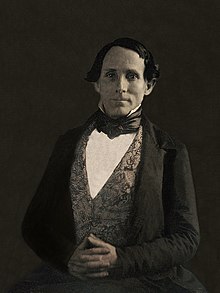Henry S. Foote | |
|---|---|
 | |
| 19th Governor of Mississippi | |
| In office January 10, 1852 – January 5, 1854 | |
| Preceded by | James Whitfield |
| Succeeded by | John J. Pettus |
| United States Senator from Mississippi | |
| In office March 4, 1847 – January 8, 1852 | |
| Preceded by | Joseph W. Chalmers |
| Succeeded by | Walker Brooke |
| Personal details | |
| Born | Henry Stuart Foote February 28, 1804 Fauquier County, Virginia, U.S. |
| Died | May 19, 1880 (aged 76) Nashville, Tennessee, U.S. |
| Resting place | Mount Olivet Cemetery Nashville, Tennessee, U.S. |
| Political party | Democratic (before 1850) Union (1850–54) Know-Nothing (1854–56) Republican (after 1875) |
| Spouse(s) | Elizabeth Winters Rachel (Boyd) Smiley |
| Children | 6 |
| Alma mater | Washington College |
| Profession |
|
| Signature | |
Henry Stuart Foote (February 28, 1804 – May 19, 1880) was a United States Senator from Mississippi and the chairman of the United States Senate Committee on Foreign Relations from 1847 to 1852. He was the Unionist Governor of Mississippi from 1852 to 1854.
Later when he moved west to California, he became an American Party (Know Nothingist) supporter of the smaller minority independent third party) while in California and nation-wide, while he was living there during the late 1850s, the know Nothings were a anti-immigrant, anti-Roman Catholic splinter extremist movement and somewhat of a cult in American political history, which led to several violent riots during elections in northeastern American big cities in the turbulent violent pre-Civil War era. They were especially strong in the border state of Maryland. During its short-lived existence, everal of its American Party members / supporters were elected to local, state and national offices, and got their start in political and civic activities.
During the American Civil War (1861-1865), Foote also was elected and served in the first and second Confederate States Congresses sessions of the Confederate States Congress, in the upper chamber of the Confederate States Senate. He was selected / appointed by the Mississippi State Legislature, again to represent seceded Mississippi in the Confederacy, meeting in their then capital city of Richmond, Virginia. It was the national legislature / legislative branch of the secessionist southern Confederate States of America government, during the war.
A practicing attorney, he published two books of memoirs related to the Civil War years, then a book on the history of Texas before its 1845 annexation by the United States, the Texas Revolution of 1836 and brief war afterwards (which led to the Mexican-American War of 1846-1848), and its earlier historical / political period of 16th to 19th centuries in the previous Spanish Empire of the Americas / colonial Viceroyalty of New Spain and in subsequent independent Mexico after 1821. Plus he also authored a post-war book on the legal profession and courts of justice in the Southern United States in the 19th century.